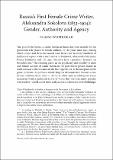Russia's first female crime writer, Aleksandra Sokolova (1833-1914) : gender, violence and agency
Abstract
This article discusses the work of Russia’s first female crime writer: Aleksandra Sokolova (1833-1914). Amongst the numerous authors writing crime fiction in the late Imperial era, Sokolova was one of only two women working in the genre. The analysis here focuses on two of Sokolova’s crime novels: Bez sleda (Without a Trace) from 1890 and Spetaia pesnia (The Song Has Been Sung) from 1892. It argues that, whilst adhering to certain conventions previously established by male authors in the genre, Sokolova productively exploits or departs from others so as to criticize the patriarchal organization of both the judicial system and Russian society more broadly. Most notably, the use of a female focalizer in Bez sleda allows Sokolova to illustrate the brutalization of women that results from their lack of agency and authority in Russia at the time.
Citation
Whitehead , C E 2021 , ' Russia's first female crime writer, Aleksandra Sokolova (1833-1914) : gender, violence and agency ' , Slavonic and East European Review , vol. 99 , no. 4 , pp. 647-675 . https://doi.org/10.5699/slaveasteurorev2.99.4.0647
Publication
Slavonic and East European Review
Status
Peer reviewed
ISSN
0037-6795Type
Journal article
Collections
Items in the St Andrews Research Repository are protected by copyright, with all rights reserved, unless otherwise indicated.

